
809.3K
Downloads
213
Episodes
Drawing on years of experience working with families, Parenting Coaches Siope Kinikini and Kimber Petersen share how families can improve, heal, and find success using the proven methods of the Teaching-Family Model. Visit smarterparenting.com to learn more.
Episodes
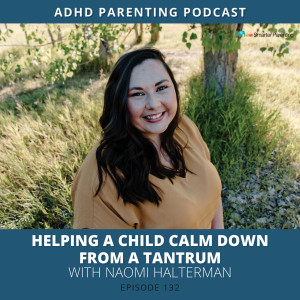
Wednesday Apr 21, 2021
Ep #132: Helping a child calm down from a tantrum
Wednesday Apr 21, 2021
Wednesday Apr 21, 2021
Have you ever wondered how to help your child when they are out of control? Are you unsure of what to do when your child is tantruming or defiant, and nothing seems to be working?
On today's podcast, Parenting Coach Siope Kinikini is joined by Naomi Halterman, director of training at Utah Youth Village. In this episode, they discuss what parents can do to help their child when their child is feeling out of control by using the behavior skills of the Teaching-Family Model.
Dealing with a child who is throwing a tantrum is never easy as it requires a lot of patience to get them back into control. A child's tantrum can involve anger, crying, defiance, or even ignoring you and will look different in younger kids versus older kids.
When teaching to a child's tantrum, remember that your goal is to help them get to a state where they can do what is asked of them without resorting to tantrum behaviors. No matter what tantrum behavior they are experiencing, how you address it remains the same.
You address tantrum behaviors by giving them small instructions to calm down and continually give that instruction until they comply.
Giving the same instruction repeatedly without a child doing it is hard for many parents. Providing the same instruction repeatedly without getting angry or frustrated signals to your child that they have permission to calm down and that you aren't mad with them for feeling overwhelmed and out of control, which is very comforting to your child.
You're going to enjoy listening to Naomi and her experience with working with the Teaching-Family Model. We can't wait for you to take a listen.
To learn more about the behavior skills talked about in this episode, visit SmarterParenting.com.
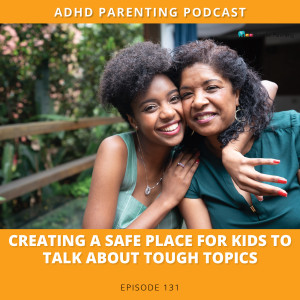
Wednesday Apr 14, 2021
Ep #131: Creating a safe place for kids to talk about hard topics
Wednesday Apr 14, 2021
Wednesday Apr 14, 2021
Creating a safe space where our children can talk about anything takes work but is incredibly important in building and strengthening our relationships.
Our kids will have questions about complex topics, and if they don't feel they can come to us, they will seek out answers elsewhere and may get information that is incorrect or goes against our belief system.
Children ask difficult questions because they are trying to make sense of the world and their place in it. We want our kids to feel comfortable asking difficult questions and need to permit them to do so.
We understand that sometimes these complex topics are triggering and can cause parents to have an emotional response or to shut down. As parents, we want to create gates, not walls, when our children approach us. Gates allow us to guide and understand where walls teach our children that what they are curious about is a problem.
The skill of Effective Communication helps parents create those gates by helping both parties feel listened to and understood. Effective Communication works with children of all ages and can be used when discussing any topics. When parents use Effective Communication, they permit their children to talk about important things to them, which, in turn, fortifies their relationship.
You can find the skill of Effective Communication at SmarterParenting.com
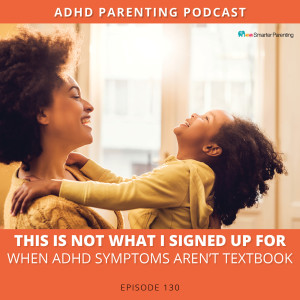
Wednesday Apr 07, 2021
Ep #130: This is not what I signed up for | When ADHD symptoms aren't textbook
Wednesday Apr 07, 2021
Wednesday Apr 07, 2021
When your child receives an ADHD diagnosis, you may think you understand what parenting them will look like. What happens when it doesn't? What do you do when your child doesn't have "typical" ADHD symptoms. How do you help them?
There is no such thing as a "typical" child--every child is unique and needs something different, often making parenting challenging as you try to figure out what they need.
While most people think of ADHD, they tend to associate hyperactivity as the primary behavior. ADHD behaviors involve more than just hyperactivity. A child with ADHD may be inattentive, have difficulty focusing, lack self-control, or have anger issues.
When parenting your child, whether or not they have ADHD isn't what you were expecting, the parenting skills we teach at SmarterParenting.com are your solutions.
Parenting skills allow you to address your child's behavior in positive ways that encourage growth and development instead of resorting to tactics that damage your child's relationship.
When you have proven parenting skills, you have the resources you need. Parenting skills help you separate your child from their negative behavior.
What do we mean by this? When a child is acting up, it can be easy to think, "They are terrible, They are mean, etc.," instead of understanding that they aren't the behavior. They aren't "bad"; they are just having difficulty processing what is happening. When we approach a situation with this mindset, we can use solutions that help our child do better in the future.
How does this work? Suppose your child is getting upset when talking to you. Instead of matching their voice tone, you can use Effective Communication to deescalate the situation as your helping your child see why they may be upset because they feel like they aren't being heard.
If your child with ADHD has problems focusing, you can use the skill of Decision Making to give them options of things they can do when they're starting to lose focus that will help them refocus, showing them they have multiple ways to react to situations.
We can't emphasize enough the confidence that parenting skills will give you. You will feel empowered and know that no matter what your ADHD child throws at you, you will be able to handle it. Parenting doesn't have to feel lonely and hard.
Learn the tools you need today to better address your child's ADHD diagnosis!
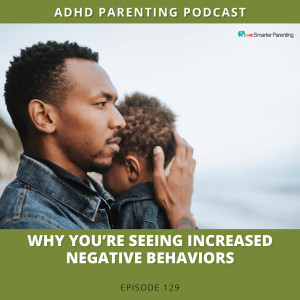
Wednesday Mar 31, 2021
Ep #129: Why you're seeing increased negative behaviors
Wednesday Mar 31, 2021
Wednesday Mar 31, 2021
If you've seen an increase in negative behaviors since the beginning of the pandemic, you are not alone.
The uncertainty and change in routine have been difficult for many families, especially for children, as they don't know how to deal with all the changes happening around them appropriately.
Kids thrive on routines as those routines allow them to feel safe and in control while understanding the world around them. When patterns are altered and keep are continually adjusted, they often don't know how to process them.
Children act up because they're feeling overwhelmed, worried, scared, sad, frustrated, stressed, etc. Understanding why they may act up allows parents to address better the root cause of what is causing their problematic behavior.
If you understand that they're acting up because they're feeling overwhelmed, you can create daily opportunities for them to meditate or take a break. If online school is causing them frustration or stress, you can implement procedures to reduce those feelings. If they're sad because they're not seeing friends or missing out on things they love, you could create online or different opportunities for them.
The skill of Following Instructions helps a child to feel in control because they understand what is expected of them. Following Instructions is can be used with children of all ages--including teenagers.
Following Instructions is one of the first behavior skills we recommend parents teach because it provides such a framework for all the other behavior skills.
Following Instructions provides the following benefits for children.
It allows children to know precisely what they are supposed to do, which reduces stress and frustration.
It meets your child at their level by enabling parents to break down complex instructions into small steps.
It gives your child confidence that they can accomplish tasks.
It allows you to focus on the good things your child is doing, ie completing a job, which shifts negative behavior sooner.
You can find the behavior skill of Following Instructions at Smarterparenting.com
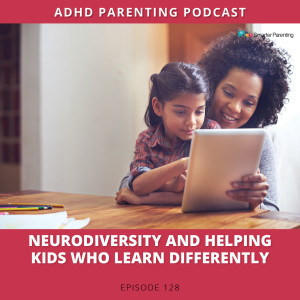
Wednesday Mar 24, 2021
Ep #128: Neurodiversity and helping kids who learn differently
Wednesday Mar 24, 2021
Wednesday Mar 24, 2021
Neurodiversity believes that children with ADHD, Autism, or other neurological diagnoses don't have a learning disability. Instead, they learn differently. Processing information differently does not make them stupid or "bad." Understanding that they learn differently allows parents to empower their children.
By reframing your child's diagnosis, we can frame their challenges as differences rather than deficits.
It is especially true when it comes to challenging behaviors. If you have had a hard time improving their behavior, it's not because they're inherently bad, but rather how you're communicating with your child isn't how they learn. The great news is that you can help them move beyond their negative behaviors to more positive behaviors using the Teaching-Family Model.
The Teaching-Family Model is influential in changing behavior because it incorporates different learning styles, setting a child up for success. It doesn't matter if your child has ADHD or not; all can find success when you use the Teaching-Family Model skills.
When parents continually teach and reinforce the skills taught on SmarterParenting.com, they help their children create new pathways in their brains. These new pathways will allow your child to perform the task independently and generalize what they have learned to other situations.
Creating new pathways doesn't happen overnight and will require a lot of teaching on your part, but the outcomes will save you stress, time, and frustration for both you and your child in the future.
On SmarterParenting.com, you will find the short video skills lessons that will set your child up for success. These video lessons are entirely free.
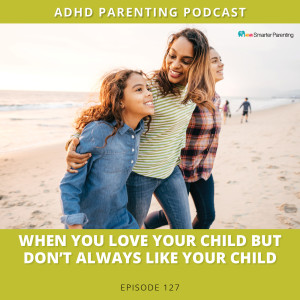
Wednesday Mar 17, 2021
Ep #127: When you love your child but don't always like your child
Wednesday Mar 17, 2021
Wednesday Mar 17, 2021
It’s normal to love our children and want to do anything for them, but not always like them because their behavior makes life difficult.
When your child’s behavior drives you nuts, you may wonder what you can do or what you need to focus on to help your child change their behavior.
One of the reasons children act out at home is that they feel safe, and part of feeling safe is testing boundaries to figure out the world around them, which is a good thing.
When we give into a child’s demand, it signals to them that this is something they can come to expect, so being consistent is so important.
When parents are constantly changing the game plan, it’s confusing for children and can cause them to act up. The more consistent you are, the safer your children will feel, reducing the need for them to act up.
One reason kids may do well at school, but then not so well at home, is because most classrooms operate with consistent schedules and expectations.
As a parent, you can create the same structure that works for your family at home. Part of creating that structure is making sure you understand your limits and taking breaks as needed.
If you are frustrated or overwhelmed, you aren’t able to help your child and often make the situation worse.
We can provide individualized help in setting up a structure that works for your family by joining the Smarter Parenting club.
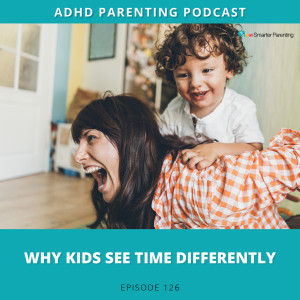
Wednesday Mar 10, 2021
Ep #126: Why kids see time differently
Wednesday Mar 10, 2021
Wednesday Mar 10, 2021
How kids see time is very different than how you see time. Understanding this will be so helpful when you are dealing with giving instructions.
Children see time as happening slowly, while adults see time as happening quickly. This is due to children getting more visual stimuli versus the stimulus that adults are receiving. When you get more visual stimuli, time appears to pass more slowly.
Your child is absorbing so much information every moment of the day, which is why your child moves "slowly" when getting ready, doing their chores, or doing their homework.
This concept is especially true when you say something to your child like, "We need to leave in 15 minutes," or "You have 5 minutes to complete this chore." Those measurements of time will mean something completely different to your child than it will to you. Because of this, your child doesn't understand why they are in trouble, or you're getting frustrated when the time is up because, in their mind, they still have time.
When interacting with your child, remember there will be a disconnect between how you see time and how your child sees time. Using the ABC's of Behavior, you can help give your child's perception of time a structure that allows you both to get on the same page, reducing frustration.
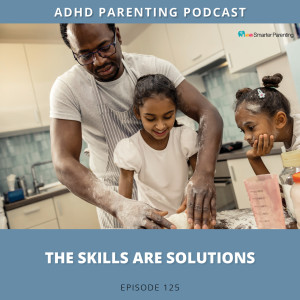
Wednesday Mar 03, 2021
Ep #125: The skills are solutions
Wednesday Mar 03, 2021
Wednesday Mar 03, 2021
Are you looking for solutions to parenting challenges?
The behavior skills of the Teaching-Family Model taught in this podcast are the solutions to your parenting needs!
Need help with tantrums? You can use the skill of Correcting Behaviors or Preventive Teaching.
Need help creating a better connection with your child? You can use Effective Communication or Effective Praise.
Need help reducing a problem behavior? You can use Effective Negative Consequences or Effective Positive Rewards.
The wonderful thing about the Teaching-Family Model is that there are multiple skills parents can use to fix problems depending on what needs their child has and what outcomes the parents are looking for.
The ability to use multiple skills allows a parent to customize how they respond, leading to increased success.
The Teaching-Family Model's goal is to create confident parents by giving them all the tools you need to deal with any situation.
For over 50 years, hundreds of families worldwide have turned to the Teaching-Family Model's evidence-based skills. Parents continue to use the skills because they work!
Learn more about the Teaching-Family Model
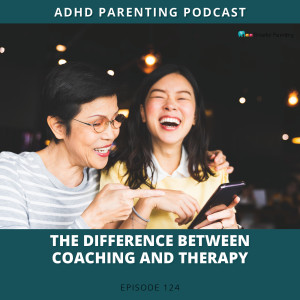
Wednesday Feb 24, 2021
Ep #124: The difference between coaching and therapy
Wednesday Feb 24, 2021
Wednesday Feb 24, 2021
Have you wondered what is the difference between coaching and therapy or tried to determine which would be best for your family?
In this episode, we discuss the difference between coaching and therapy and how you can determine your child's needs.
Therapy is focused on healing from mental health issues and the difficult emotions you're feeling because of your mental health issues. Mental health issues include the diagnosis such as depression, anxiety, Autism, trauma, and PTSD. A therapist is someone who is licensed to address these specific issues.
On the other hand, a coach is someone you go to when you want to get unstuck and set achievable goals. A coach helps you replace unhealthy or unsuccessful habits with new ones.
Both coaching and therapy can be beneficial to your child. Many parents will do both coaching and therapy as a way to address difficulties more comprehensively.
The goal in deciding between coaching, therapy, or both is to determine what would be the best course of action to address what your child struggles with.
Smarter Parenting only provides coaching. When you sign up for a coaching session, you will learn how to implement the Teaching-Family Model's behavior skills to address specific behavior issues by getting a tailored plan specific to your family's needs.
Coaching allows us to help families all over the world improve relationships and find success.
If your family could benefit from coaching, sign up for the gold or platinum level of the Smarter Parenting Club.
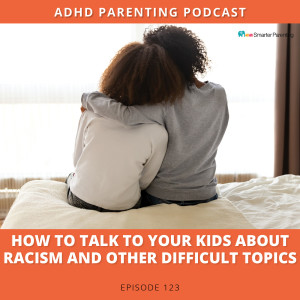
Wednesday Feb 17, 2021
Ep #123: How to talk to your kids about racism and other difficult topics
Wednesday Feb 17, 2021
Wednesday Feb 17, 2021
We can talk to our children about racism, religion, politics, sex, drugs, or social issues without the conversations turning into a heated debate.
When topics are challenging to discuss, we tend to avoid talking about them.
We need to talk about these crucial issues. Change doesn't happen until we can talk about these issues without getting defensive or emotional.
You don't have to know everything, or even agree, but being able to really listen to your child's concerns and answer any question honestly is vital in creating an atmosphere of trust and acceptance.
Talking about complicated topics isn't easy for most children. If you respond with anger or frustration, they will stop coming to you for advice.
If they don't feel comfortable talking to you, they will find someone they do feel comfortable talking with, and you may not always like the advice they receive.
The skill of Effective Communication is life-changing. When a child can feel heard and understood, even if you don't always believe the same, they will value your opinion, and your relationship will grow.
Effective Communication shows you how to remove the emotional response from communication. Doing this allows you to listen to understand instead of listening to respond. Using Effective Communication will enable you to find common ground, see multiple viewpoints, and better understand others' experiences.
